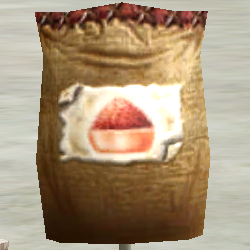Difference between revisions of "Potash"
m (lifted up to T9) |
m (→Cost: wateryoutalkinbout) |
||
| Line 23: | Line 23: | ||
'''In a [[Kettle]]''' (creates 5 Potash): | '''In a [[Kettle]]''' (creates 5 Potash): | ||
*5 [[Ash]] | *5 [[Ash]] | ||
| − | *25 [[Water | + | *25 [[Water]] |
*28 [[Wood]] uses Stoked Method | *28 [[Wood]] uses Stoked Method | ||
Revision as of 04:46, 20 September 2019
| Potash | ||
|---|---|---|
 |
||
| (Item) | ||
|
||
|
Sources
Potash is an alkaline chemical ingredient used in making glass and treating wood and metals. It is boiled in a Kettle, evaporated in a Tub or made in a Chemistry Laboratory
In a Basic Tub, Sturdy Tub, or Marble Tub (1 Potash):
- 75 Salt Water has a chance of generating potash
Uses
- 2 Potash are used to produce 1 deben of Normal and Fine Glass in a Glazier's Bench.
Cost
In a Kettle (creates 5 Potash):
Check the Kettle page for more information on Kettle outputs and firing rhythms. Takes 15 Teppy Minutes to boil off the water.
In a Chemistry Laboratory:
- Made from ash using Potash Ointment.
Uses
- 2 Potash are used to produce 1 deben of Normal and Fine Glass in a Glazier's Bench.
- An ingredient for treating boards in a Wood Treatment Tank.
- One of the catalysts used to mix paint in a Pigment Laboratory.
- 1 Potash per batch of Metal Salts in an Acid Bath.
- An ingredient for treating metal in a Chemical Bath.
Research and Tuition
- 200 required for Advanced Chemistry 1 research
- 5000 required to research Basic Metal Treatment
- 100 required for Neutralization research
- 1500 required for Wood Treatment research
Required By
Chemistry, Metal Treatment, Neutralization, Treated Metal, Wood Treatment
Produced By
Basic Tub, Cooperage, Kettle, Sturdy Tub